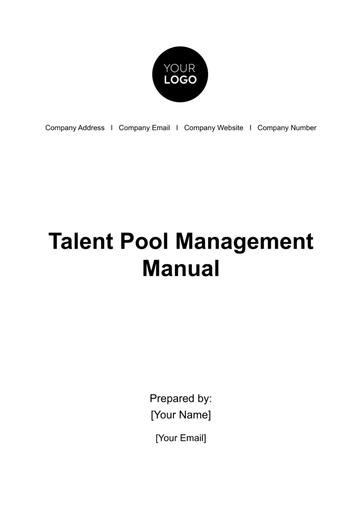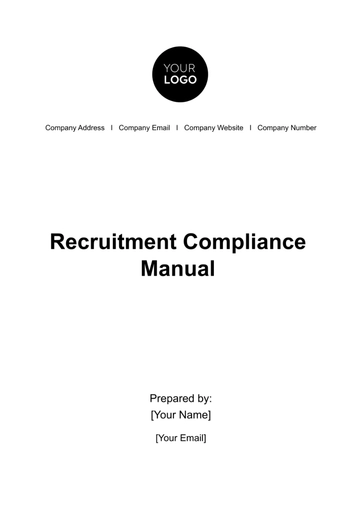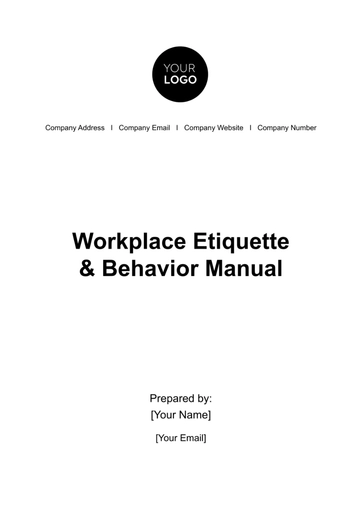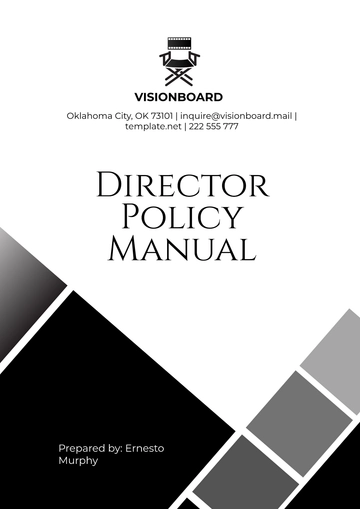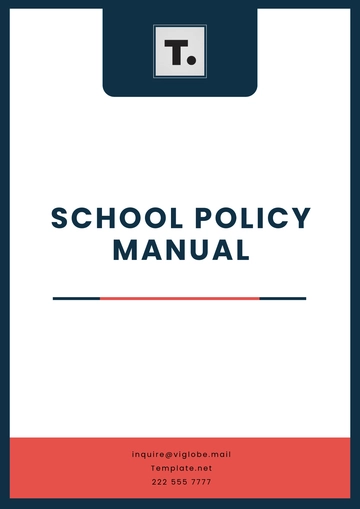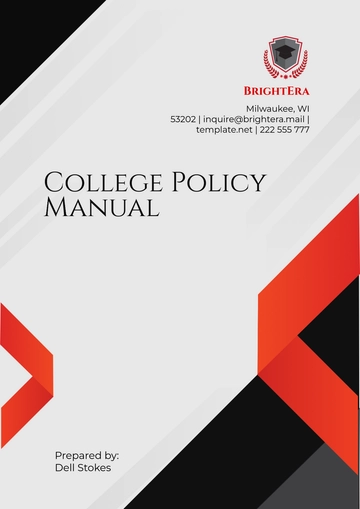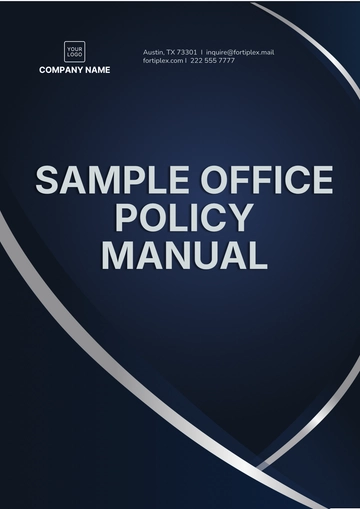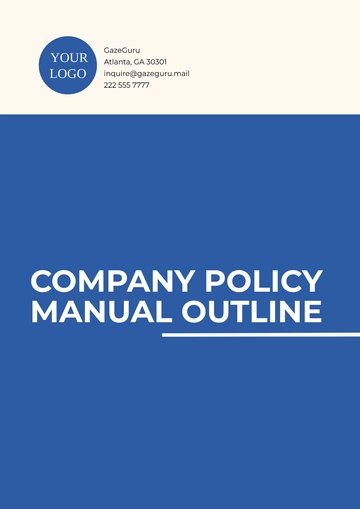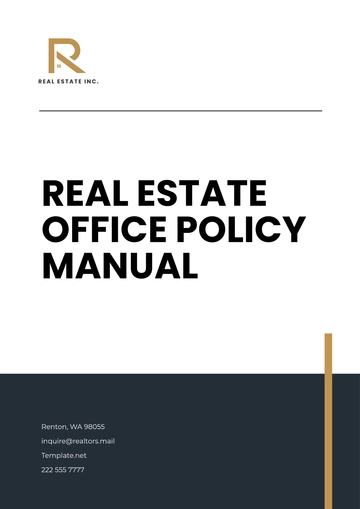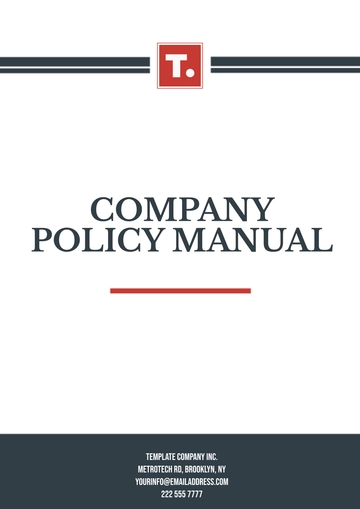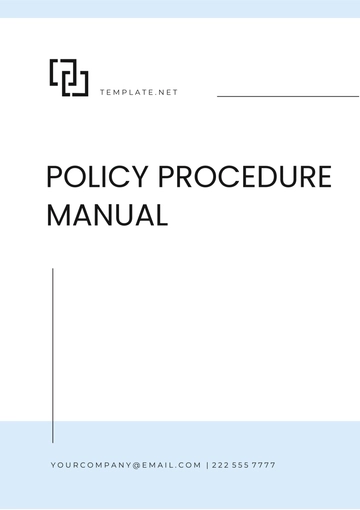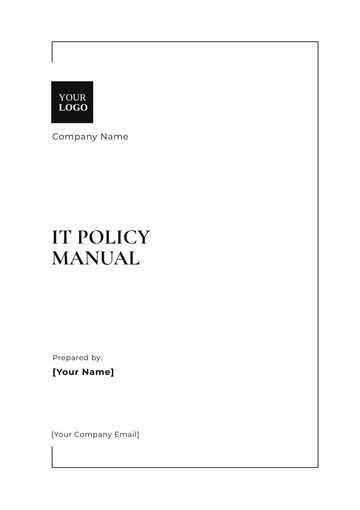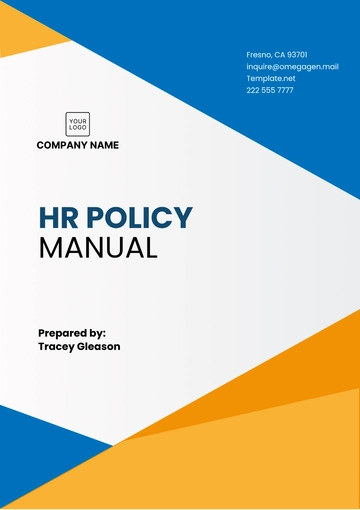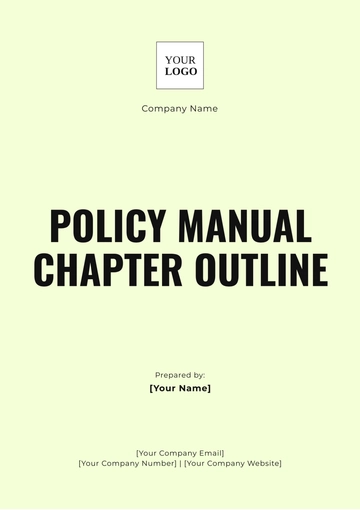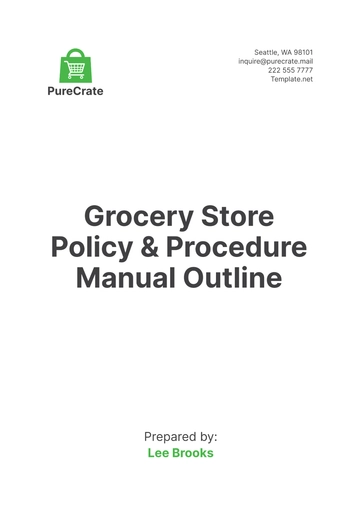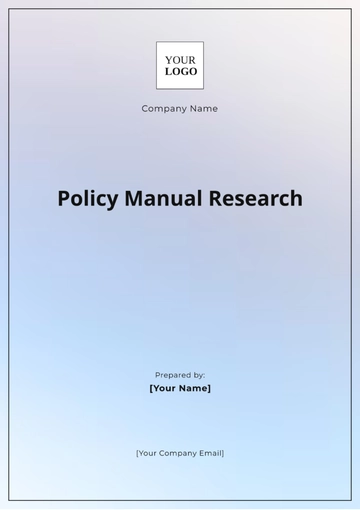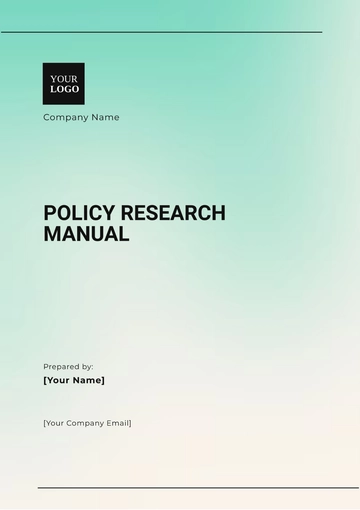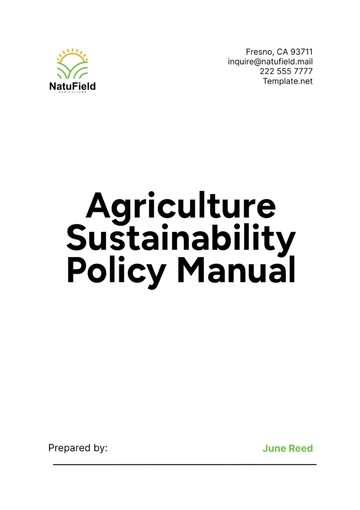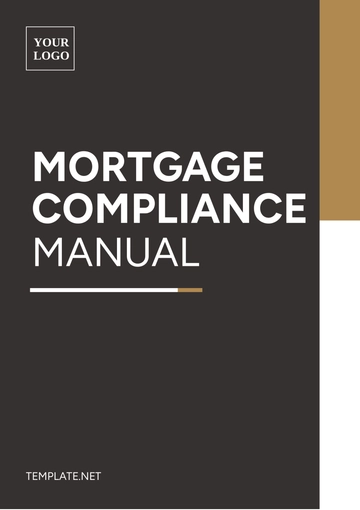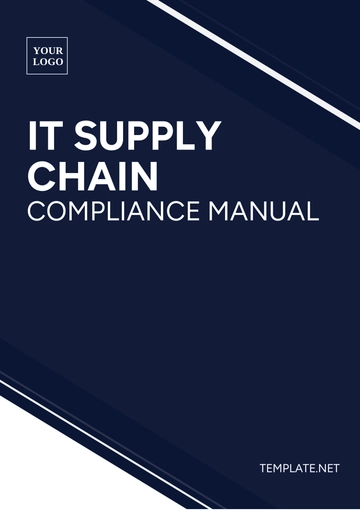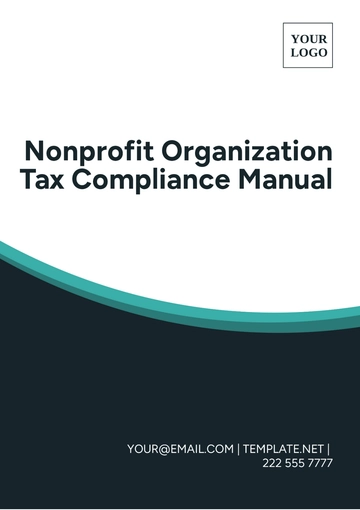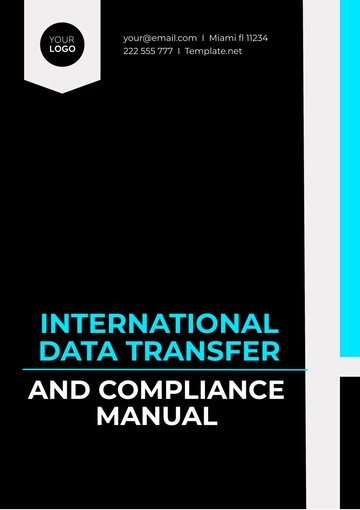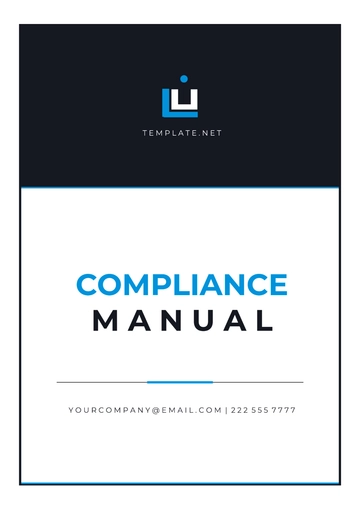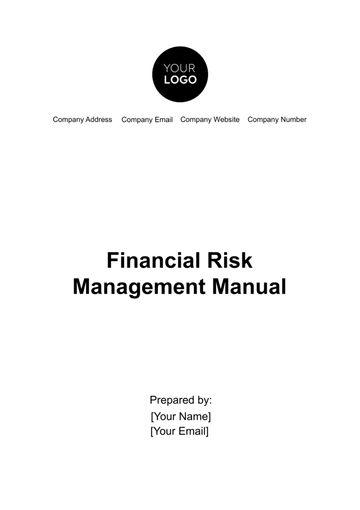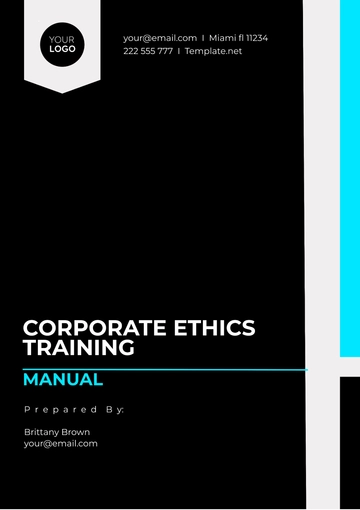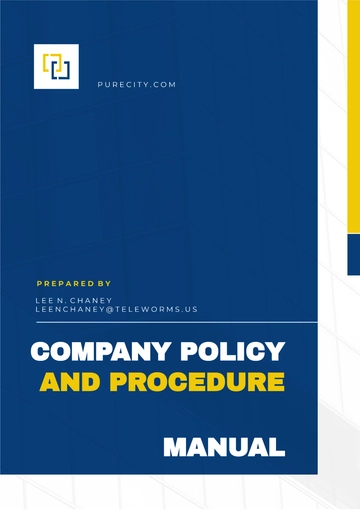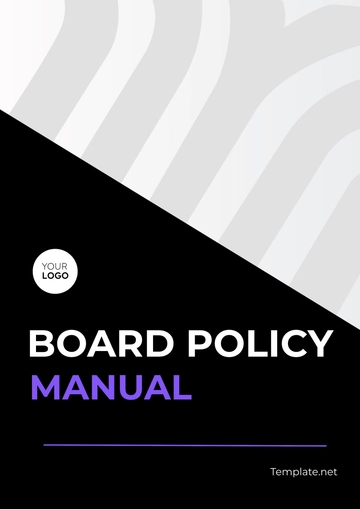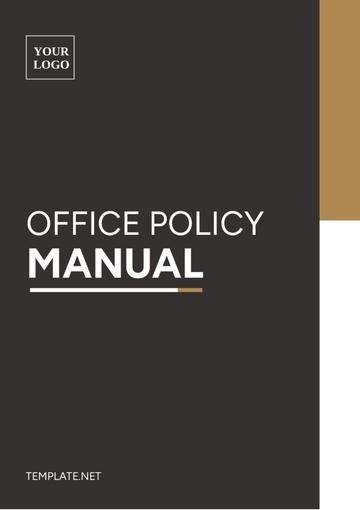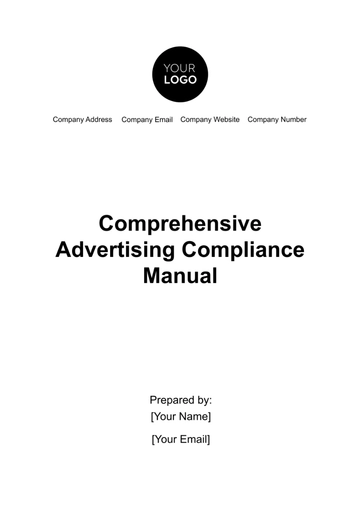Free College Policy Manual
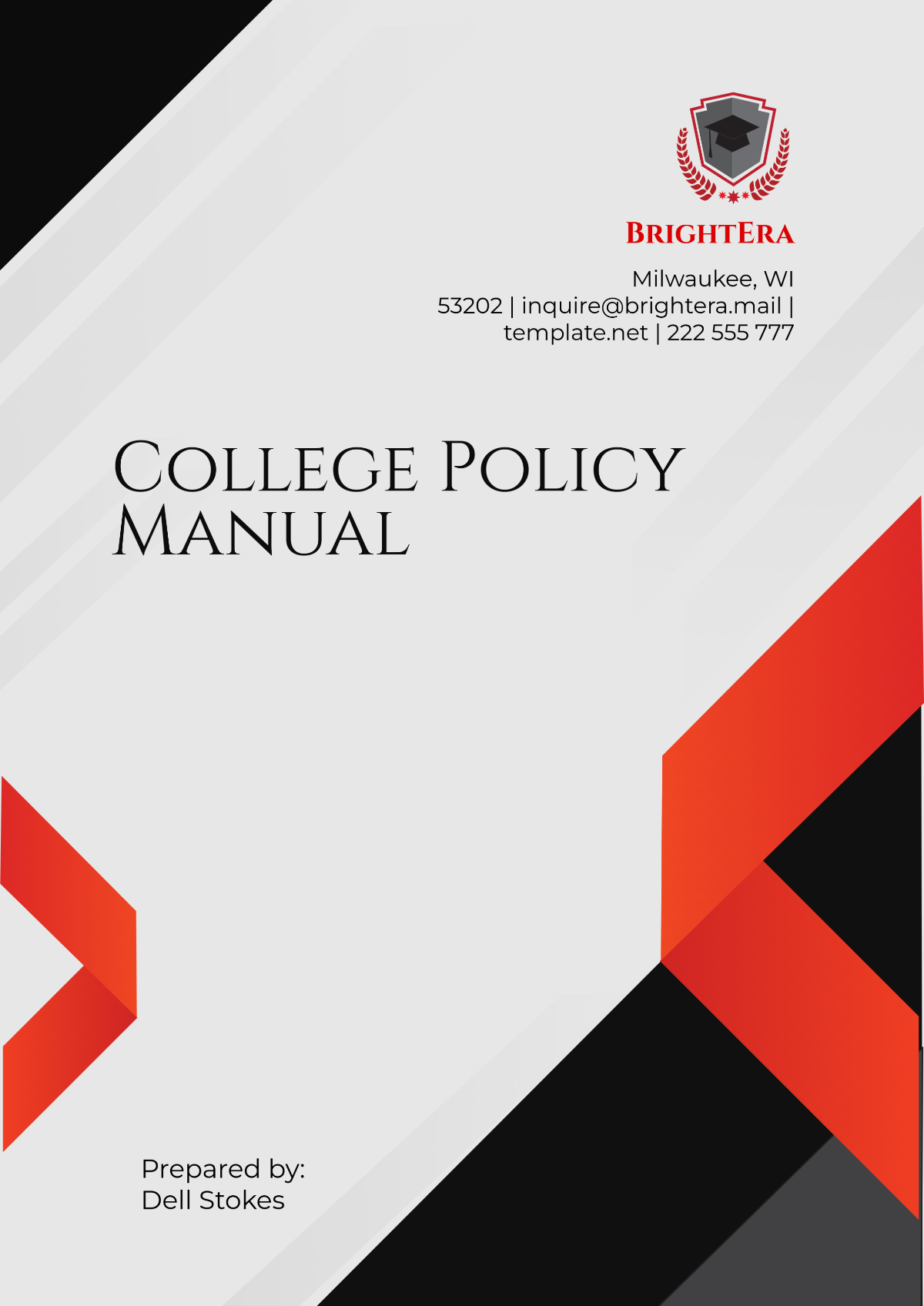
1. Introduction
1.1 Purpose
The purpose of this College Policy Manual is to establish clear, concise, and consistent policies and procedures that will guide the operations, responsibilities, and expectations of both students and staff at [Your Company Name]. It ensures that all individuals associated with the institution are aware of their rights, obligations, and the standards they are expected to uphold. This manual serves as a comprehensive guide to understanding the administrative and academic structure of the college and aims to foster an environment of excellence, integrity, and respect.
1.2 Scope
This manual applies to all students, faculty, staff, and administrators of [Your Company Name] as well as any third-party contractors, partners, or affiliates. It covers various areas such as academic policies, student conduct, employee expectations, campus safety, and legal compliance. All policies in this manual are subject to revisions, amendments, and updates as necessary, to ensure they remain in alignment with the evolving educational landscape and legal standards.
1.3 Mission Statement
[Your Company Name] is committed to fostering a dynamic learning environment that empowers students to achieve academic excellence, personal growth, and professional success. The college strives to create an inclusive, diverse, and supportive community that encourages innovation, critical thinking, and lifelong learning. We aim to provide students with the resources and opportunities they need to succeed academically, socially, and professionally, both within the classroom and in the broader community.
2. Academic Policies
2.1 Admissions Policy
2.1.1 Eligibility
To be eligible for admission to [Your Company Name], applicants must meet specific academic and personal qualifications. The primary requirements for undergraduate students include the completion of a secondary education program, such as a high school diploma or equivalent. For graduate students, the required qualifications include the completion of an undergraduate degree from an accredited institution. In addition to academic qualifications, applicants must demonstrate good character and adherence to the values upheld by the institution.
2.1.2 Application Process
The application process at [Your Company Name] is designed to be straightforward and transparent. All prospective students must complete an online application form, which includes submitting transcripts, letters of recommendation, a personal statement, and proof of any standardized test scores, if required. Once submitted, the admissions office will review all materials and, based on the information provided, make a decision on the applicant's eligibility. Applicants will be notified of the decision within [30] days of application submission.
2.1.3 Transfer Students
Transfer students from other accredited colleges or universities may apply for admission to [Your Company Name]. The transfer application process is similar to that of incoming freshmen, with the added requirement of submitting official transcripts from all previous postsecondary institutions attended. The college reserves the right to accept or deny transfer credits based on the course content and the accreditation status of the previous institution.
2.2 Grading Policy
2.2.1 Grading Scale
The grading scale at [Your Company Name] is as follows:
Grade | GPA Equivalent | Description |
|---|---|---|
A | 4.0 | Excellent |
B | 3.0 | Good |
C | 2.0 | Satisfactory |
D | 1.0 | Poor |
F | 0.0 | Fail |
The GPA equivalent reflects the grade points awarded per credit hour. A grade of A represents the highest level of achievement, while a grade of F indicates a failure to meet the academic standards of the course. Students must maintain a minimum cumulative GPA of [2.0] to remain in good academic standing.
2.2.2 Incomplete Grades
An incomplete grade (I) may be assigned to a student when they are unable to complete the required coursework by the end of the semester due to extenuating circumstances, such as illness or personal hardship. The student must submit a request for an incomplete grade, supported by appropriate documentation, to the course instructor. The instructor will then determine whether to grant the incomplete grade and establish a timeline for completion of the outstanding work.
2.3 Attendance Policy
2.3.1 Required Attendance
Regular attendance is crucial to a student's academic success at [Your Company Name]. Students are expected to attend all scheduled classes and participate actively in course activities. If a student anticipates being absent, they are encouraged to notify the instructor ahead of time and make arrangements to catch up on missed work. The college recognizes that certain circumstances may lead to absences, but it is ultimately the student's responsibility to manage their attendance and communicate with their instructors.
2.3.2 Excessive Absences
Excessive absences can negatively affect a student's academic performance and may result in penalties, including a reduction in grade or withdrawal from the course. The definition of "excessive" varies by instructor and course, but generally, more than [three] unexcused absences may lead to academic consequences. Students are encouraged to speak with their instructors if they encounter personal or academic challenges that may interfere with their attendance.
2.4 Academic Integrity
2.4.1 Code of Conduct
[Your Company Name] upholds the highest standards of academic integrity. All members of the college community are expected to demonstrate honesty and ethical behavior in all academic endeavors. Plagiarism, cheating, and other forms of academic dishonesty are strictly prohibited. Students found guilty of academic misconduct may face disciplinary action, including a failing grade for the course or expulsion from the institution.
2.4.2 Plagiarism Policy
Plagiarism is defined as presenting someone else's work, ideas, or expressions as one's own without proper acknowledgment. This includes copying text from published sources, submitting work written by someone else, or failing to cite sources correctly. Students found guilty of plagiarism will be subject to disciplinary procedures, including the possibility of receiving a grade of F for the assignment or course.
2.5 Graduation Requirements
To graduate from [Your Company Name], students must complete all required coursework for their degree program and achieve a minimum cumulative GPA of [2.0]. Additionally, students must fulfill any other program-specific requirements, such as internships, practicums, or capstone projects. Commencement ceremonies are held annually, and students who meet graduation requirements will be notified of their eligibility in the semester preceding the ceremony.
3. Student Policies
3.1 Code of Student Conduct
3.1.1 General Expectations
[Your Company Name] expects all students to behave in a manner that reflects the values and principles of the college. Students should act with respect for others and contribute to a positive learning environment. This includes demonstrating responsibility, honesty, and integrity in all interactions on campus, both academic and social.
3.1.2 Violations of Conduct
Violations of the student conduct code include but are not limited to:
Academic dishonesty (e.g., cheating or plagiarism)
Vandalism or destruction of property
Harassment or discrimination based on race, gender, religion, etc.
Substance abuse violations
Disruptive behavior in the classroom or on campus
Theft
Students found guilty of violating the code of conduct may face disciplinary action, including warnings, probation, suspension, or expulsion from the college.
3.2 Student Rights and Responsibilities
3.2.1 Rights
Students at [Your Company Name] have the right to:
A safe and supportive learning environment free from discrimination
Access to academic and career advising services
Participate in extracurricular activities and organizations
Receive fair treatment in academic matters
Appeal academic or disciplinary decisions
3.2.2 Responsibilities
In addition to their rights, students have the responsibility to:
Maintain academic integrity and honesty
Follow all institutional policies and procedures
Contribute to a respectful and inclusive campus environment
Meet deadlines and attend classes regularly
Respect the property and privacy of others
3.3 Student Support Services
3.3.1 Counseling Services
[Your Company Name] offers counseling services to students who need support for personal, emotional, or mental health challenges. Counseling is confidential and available to all students, either in person or through virtual sessions. The goal of counseling services is to help students cope with academic pressures, personal issues, and life transitions in a healthy and supportive environment.
3.3.2 Academic Support
Students who need additional help with their coursework can access academic support services, including tutoring, writing assistance, and study groups. The academic support center offers personalized assistance in subjects ranging from mathematics to literature and beyond, ensuring that all students have the resources they need to succeed.
4. Faculty and Staff Policies
4.1 Hiring and Employment
4.1.1 Equal Opportunity Employment
[Your Company Name] is committed to providing equal opportunity employment. The college does not discriminate based on race, color, religion, gender, national origin, age, disability, or any other protected class. Faculty and staff are selected based on their qualifications, experience, and alignment with the institution's mission and values.
4.1.2 Faculty Responsibilities
Faculty members at [Your Company Name] are expected to deliver high-quality education, contribute to the academic growth of students, engage in professional development, and maintain office hours for student consultation. Faculty are also responsible for staying current in their field of expertise and participating in the college community.
4.2 Code of Conduct for Faculty and Staff
4.2.1 Professionalism
Faculty and staff are expected to exhibit professionalism at all times, both in their interactions with students and in their work environment. This includes maintaining a respectful attitude, honoring confidentiality, and adhering to institutional policies and ethical standards.
4.2.2 Confidentiality
Faculty and staff are required to maintain the confidentiality of student records and any sensitive information related to college operations. The college follows all federal and state laws regarding privacy, including the Family Educational Rights and Privacy Act (FERPA).
5. Campus Safety and Security
5.1 Safety and Emergency Procedures
5.1.1 General Safety Guidelines
The safety and well-being of students, faculty, and staff are a top priority at [Your Company Name]. The college is committed to maintaining a safe campus environment through preventative measures and responsive actions to emergencies. All members of the college community are expected to follow safety guidelines and report any hazards, accidents, or unsafe behaviors promptly.
Basic safety measures include:
Familiarity with campus emergency exits and evacuation routes
Reporting suspicious activities or individuals to campus security
Locking personal belongings in designated secure areas
Ensuring that doors and windows are locked when not in use
Adhering to fire safety protocols and avoiding the use of open flames in unauthorized areas
5.1.2 Emergency Procedures
In the event of an emergency, students, faculty, and staff must act swiftly and calmly. [Your Company Name] has established comprehensive emergency procedures for a range of situations, including fire, medical emergencies, active shooter incidents, and natural disasters. These procedures are communicated during new student orientation, staff training sessions, and are posted in various locations on campus.
Emergency procedures include:
Evacuation Plans: Clearly marked exits, designated meeting areas, and evacuation routes.
Medical Emergencies: Contacting campus health services or local emergency responders (dialing [911]).
Active Shooter Response: Locking doors, hiding in secure locations, and following instructions from law enforcement.
Weather Emergencies: Procedures for severe weather, including evacuations during tornadoes or sheltering during hurricanes.
Training sessions, drills, and informational resources are regularly provided to ensure preparedness.
5.2 Campus Security
5.2.1 Campus Security Personnel
[Your Company Name] employs a dedicated security team to patrol the campus, monitor surveillance equipment, and respond to incidents. Campus security officers are trained professionals who are available [24] hours a day, [7] days a week. Security personnel are responsible for maintaining order, responding to emergencies, and enforcing college policies related to safety and behavior.
5.2.2 Security Services
In addition to on-campus patrols, security services at [Your Company Name] include:
Escort Services: Students, staff, and faculty can request escorts to their vehicles or dormitories during late hours.
Lost and Found: A secure area where lost items are stored, and individuals can retrieve their belongings.
Crime Prevention Programs: Ongoing initiatives to educate the campus community about personal safety, theft prevention, and reporting procedures.
The college encourages everyone to take proactive measures to ensure their own safety, including being aware of their surroundings and locking personal belongings in designated areas.
5.3 Alcohol and Drug Policy
5.3.1 Prohibited Substances
[Your Company Name] strictly prohibits the use, possession, or distribution of illegal drugs, controlled substances, and alcohol on campus property or during college-sponsored activities. This policy is in place to maintain a safe, healthy, and productive environment for all members of the campus community.
Alcohol is allowed in designated areas for certain events with prior approval, but any misuse or overconsumption is subject to disciplinary action. Students, faculty, and staff are expected to comply with local, state, and federal laws regarding substance use. Violations of this policy may result in serious consequences, including suspension, expulsion, or termination of employment.
5.3.2 Drug and Alcohol Education
The college provides educational resources and counseling for individuals struggling with substance abuse. Awareness programs, workshops, and counseling services are available to students, staff, and faculty. These programs emphasize the dangers of substance abuse, the impact it can have on academic and personal life, and available support systems for recovery.
The college also collaborates with local law enforcement agencies to conduct regular drug and alcohol awareness campaigns.
5.4 Health and Wellness Services
5.4.1 Campus Health Services
[Your Company Name] provides on-campus health services to all registered students. The health center offers basic medical care, including first aid, flu vaccinations, health screenings, and referrals to specialists when necessary. The health center is staffed with licensed medical professionals, and students can make appointments or walk in for assistance.
Emergency medical care is available [24] hours a day, [7] days a week, through a partnership with local hospitals and clinics. In case of a severe medical emergency, students should immediately dial 911.
5.4.2 Mental Health Services
Mental health services are an essential part of maintaining overall well-being at [Your Company Name]. The college provides individual and group counseling services to support students dealing with stress, anxiety, depression, and other mental health concerns. Confidential counseling sessions are available free of charge for all enrolled students.
In addition to individual counseling, the college hosts workshops and peer support groups that focus on stress management, building resilience, and improving emotional well-being.
5.5 Campus Transportation
5.5.1 Parking Policy
[Your Company Name] offers parking facilities for students, faculty, and staff. All individuals wishing to park on campus must obtain a parking permit from the campus security office. Parking permits are available at the beginning of each semester and are subject to availability.
Student Parking: Designated student parking areas are located near residence halls and academic buildings. Students are prohibited from parking in faculty or visitor areas.
Faculty/Staff Parking: Reserved parking spaces are provided for faculty and staff in close proximity to their work areas.
Visitor Parking: A limited number of visitor parking spaces are available for guests attending events, meetings, or visiting campus.
Vehicles must be parked in designated areas, and violators will be subject to fines or towing.
5.5.2 Shuttle Service
For students, faculty, and staff who prefer not to drive or who live off-campus, [Your Company Name] offers a free shuttle service that operates on a regular schedule. The shuttle provides transportation to and from various campus locations, including dormitories, academic buildings, and nearby student housing.
The shuttle service is available during regular business hours and late into the evening, with adjusted schedules during holidays or breaks.
6. Financial Policies
6.1 Tuition and Fees
6.1.1 Tuition Rates
The tuition rate at [Your Company Name] is reviewed annually and adjusted based on inflation and other economic factors. The current tuition rate for undergraduate students is $[15,000] per academic year, while graduate students pay $[20,000] annually for most programs. Rates for professional and specialized programs may vary and are subject to the program's specific guidelines.
The college provides clear breakdowns of tuition costs, including associated fees for enrollment, materials, technology, and activities.
6.1.2 Payment Plans
To ease the financial burden, [Your Company Name] offers several payment plans. Students may choose to pay tuition in full at the beginning of the semester, or they can opt for monthly installment plans. The monthly payment plan divides the tuition cost into [4] equal installments per semester.
Students can manage their tuition payments through the college's online student portal, where they can track their balance and make secure payments.
6.1.3 Financial Aid
[Your Company Name] offers a range of financial aid options, including scholarships, grants, and loans. The financial aid office works closely with students to identify available resources and guide them through the application process.
Merit-based Scholarships: Awarded to students who demonstrate outstanding academic achievement or talent in specific fields.
Need-based Grants: Available for students from low-income families who demonstrate financial need.
Federal and State Financial Aid: Federal Pell Grants and state-sponsored assistance are available for eligible students based on their financial circumstances.
The financial aid office provides counseling and workshops on budgeting, managing student debt, and exploring additional funding opportunities.
6.2 Refund Policy
6.2.1 Tuition Refunds
If a student withdraws from a course or from [Your Company Name] before the start of the semester, they may be eligible for a full or partial tuition refund. The refund schedule is as follows:
Withdrawal before the first day of class: [100%] refund
Withdrawal within the first [7] days of class: [80%] refund
Withdrawal within [8] to [14] days of class: [50%] refund
Withdrawal after [14] days of class: No refund
Refunds are processed and issued within [30] days of the official withdrawal date.
6.2.2 Housing and Meal Plan Refunds
Students who withdraw from [Your Company Name] before the beginning of the semester may also receive a refund for housing and meal plans. The housing refund policy follows the same schedule as the tuition refund policy, with prorated adjustments based on the withdrawal date.
Meal plan refunds are provided on a prorated basis, depending on the number of weeks the student attended the semester. Refund requests for housing and meal plans must be submitted to the college's housing office.
7. Key Takeaways
The Key Takeaways section is designed to highlight the most important policies and procedures outlined in the College Policy Manual. This summary provides a concise overview of the key points that every student, faculty member, and staff member at [Your Company Name] should be aware of. Below are the critical takeaways from each section of the manual.
7.1 Academic Policies
Admissions: Applicants must meet academic qualifications and demonstrate good character. The admissions process involves submitting an online application, transcripts, letters of recommendation, and, if applicable, standardized test scores. Transfer students must also submit official transcripts for evaluation.
Grading: The college uses a 4.0 grading scale, with grades ranging from A (Excellent, [4.0] GPA) to F (Fail, [0.0] GPA). Students are expected to maintain a minimum GPA of [2.0] to remain in good standing.
Attendance: Regular attendance is crucial, and excessive absences may lead to penalties. Students are expected to notify instructors of absences in advance.
Academic Integrity: All students are expected to uphold high standards of academic honesty. Plagiarism and cheating are prohibited and may result in disciplinary action, including a failing grade or expulsion.
Graduation Requirements: Students must complete all required coursework and achieve a minimum GPA of [2.0] to graduate. Specific program requirements may include internships or capstone projects.
7.2 Student Policies
Code of Conduct: Students must demonstrate respect for others and adhere to institutional policies regarding behavior, including no tolerance for academic dishonesty, harassment, or substance abuse. Violations can lead to disciplinary action ranging from warnings to expulsion.
Student Rights and Responsibilities: Students have the right to a safe, non-discriminatory learning environment and access to academic resources. They are also responsible for maintaining academic integrity, attending classes regularly, and adhering to the college’s policies.
Student Support Services: The college offers counseling, academic support, and mental health services to help students succeed. Students are encouraged to utilize these services as needed.
7.3 Faculty and Staff Policies
Hiring and Employment: The college is committed to equal opportunity employment and seeks qualified faculty and staff who align with the institution's mission. Faculty members are expected to maintain professional standards and engage in continuous development.
Code of Conduct for Faculty and Staff: Faculty and staff must adhere to professional behavior, maintain confidentiality, and follow the institution’s policies. This ensures a respectful and ethical campus environment.
7.4 Campus Safety and Security
Emergency Procedures: All members of the campus community must familiarize themselves with the college’s emergency procedures, including evacuation plans, active shooter protocols, and responses to natural disasters.
Alcohol and Drug Policy: The use of illegal substances and the misuse of alcohol is strictly prohibited on campus. Educational resources and counseling services are available for students dealing with substance abuse.
Campus Security: Campus security personnel are available [24] hours a day, [7] days a week. The college offers escort services, lost and found, and crime prevention programs. Students are encouraged to report suspicious activities.
Health and Wellness Services: On-campus health and mental health services are available to students. These services are confidential and free of charge. Students are encouraged to use these resources to maintain their well-being.
7.5 Financial Policies
Tuition and Fees: The tuition for undergraduate students is $[15,000] annually, with graduate programs generally costing $[20,000] per year. Payment plans are available, and students may opt for monthly installments.
Financial Aid: The college offers merit-based scholarships, need-based grants, and federal and state financial aid. Students must complete the FAFSA to determine eligibility for financial aid.
Refund Policy: Tuition and housing refunds are available based on the student’s withdrawal date. Students who withdraw before the semester begins are eligible for a full refund, with a prorated refund offered for later withdrawals.
7.6 Campus Transportation and Facilities
Parking: Students, faculty, and staff must obtain parking permits to park on campus. There are designated parking areas for students, faculty, and visitors.
Shuttle Service: The college provides free shuttle services for those who live off-campus or prefer not to drive. The shuttle operates during regular business hours and late evening hours for convenience.
7.7 Final Reminders
Review and Compliance: All members of the college community should familiarize themselves with the policies in this manual to ensure compliance. Adherence to these policies is essential for creating a productive, respectful, and safe campus environment.
Ongoing Updates: [Your Company Name] regularly updates this manual to reflect changes in laws, academic standards, and institutional priorities. It is the responsibility of students, faculty, and staff to stay informed of any revisions or updates to these policies.
Accessing the Full Manual: The complete College Policy Manual is available online for reference. Any questions or clarifications regarding specific policies can be directed to the appropriate department or the campus administration.
By understanding and following the guidelines outlined in this manual, all members of the [Your Company Name] community contribute to the institution's mission of providing a safe, enriching, and successful academic experience.
- 100% Customizable, free editor
- Access 1 Million+ Templates, photo’s & graphics
- Download or share as a template
- Click and replace photos, graphics, text, backgrounds
- Resize, crop, AI write & more
- Access advanced editor
Establish clear guidelines with the College Policy Manual Template from Template.net. This editable and customizable template provides a structured format for developing comprehensive policies. Easily adjust it with the AI Editor Tool to align with your college’s specific regulations. Download now to create a professional policy manual.
